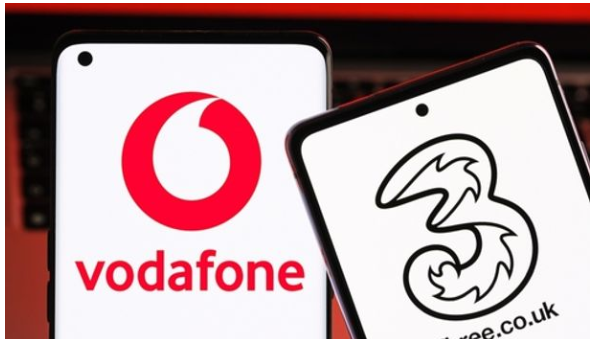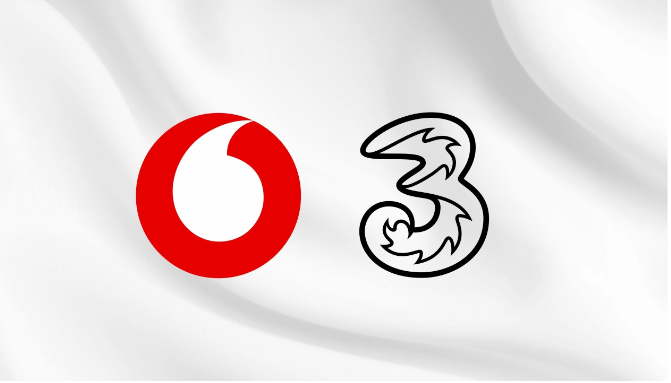 Phase one investigation into the potential impacts of the merger between two of the UK’s four operators was launched in January. The proposed deal was announced in june last year, and would create a new joint venture bringing their 27 million combined customers under a new operator.
Phase one investigation into the potential impacts of the merger between two of the UK’s four operators was launched in January. The proposed deal was announced in june last year, and would create a new joint venture bringing their 27 million combined customers under a new operator.
This purpose of phase one was to dig into potential detrimental market and consumer factors that would be brought about by the deal, and in the announcement the CMA said it is concerned it could lead to mobile customers facing higher prices and reduced quality.
It found that Vodafone and Three ‘provide important alternatives for mobile customers’ and that is Three also generally the cheapest of the four mobile network operators. It is therefore concerned that combining them will reduce rivalry which it obviously will in terms of the number of companies in the space.
Competitive pressure can help to keep prices low, as well as provide an important incentive for network operators to improve their services, including by investing in network quality, says the release.
It is also concerned that the deal may make it difficult for MVNOs to negotiate good deals for their customers, by reducing the number of mobile network operators capable of hosting them.
Millions of people in the UK depend on effective competition in the mobile market in order to access the best deals for them, said Julie Bon, Phase 1 decisionmaker for the case at the CMA. Whilst Vodafone and Three have made a number of claims about how their deal is good for competition and investment, the CMA has not seen sufficient evidence to date to back these claims.
Our initial assessment of this deal has identified concerns which could lead to higher prices for customers and lower investment in UK mobile networks. These warrant an in-depth investigation unless Vodafone and Three can come forward with solutions.
Having reached this important milestone, we look forward to working with the independent panel on the Phase 2 process, said Vodafone UK CEO, Ahmed Essam. By merging our two companies, we will be able to invest £11 billion to help the UK realise its ambitions to be a world leader in next-generation 5G technology, and increase competition across the industry. This transaction will create an operator with the scale required to take on BTEE and VMO2, give MVNOs greater choice in the wholesale market and is in the wider interests of customers, competition and the country.
Three UK CEO, Robert Finnegan said: The current market structure is holding the UK back, which is not good for customers or competition. By creating a third player with the necessary scale to invest, the combination of our two companies will deliver one of Europe’s most advanced networks and move the UK into the digital fast lane, benefiting customers from Day One.
This news does not seem to have come as a surprise to analysists. Paolo Pescatore from PP Foresight said: A detailed Phase 2 investigation was widely expected. In fact any other outcome would have been a surprise. There are some concerns which need to be addressed. Therefore, expect both parties to agree to concessions on spectrum and the merged entity will have to provide solutions on areas like network sharing, rather than create another problem. . Both parties need to demonstrate that this is genuinely in the interest of UK plc, the economy, and consumers for it to have a chance of getting over the line.
Unlike the Virgin Media and O2 merger which decided to go straight to phase 2, it was important to start the engagement and build up the facts during this Phase 1 process. A marriage of convenience makes sense. Scale is key to help lower costs and improve margins. It could take years before we see the real fruits of this deal come to fruition if it goes ahead. The question is, can the UK wait that long? However, convergence still remains the Achilles heel if this does get over the line. It would create a mobile champion that could increase competition in the wholesale segment of the market and become a partner of choice for MVNOs.
James Gray, MD of Graystone Strategy added: As expected the CMA has granted the more in-depth phase 2 of the Three / Vodafone merger review. Its reasons are clear – degradation to service, difficult conditions for MVNOs like Sky, Lyca and Lebara, and higher prices for consumers all need to be ruled out. Therefore the process won’t be quick, but it will be thorough, weighing up the advantages it will bring to much needed and expensive 5G infrastructure investment and consumer choice against impact to market competition and economic prospects.

My view is to the contrary. The UK is already very competitive thanks to its buoyant MVNO sector. The likes of Sky holds their own, with considerable market power despite not having a network. Its fibre business is attractive to customers who want to bundle media and telecom subscriptions. In the issue of service, short term there may be some degradation of service. However with spectrum sharing and £11bn investment in 5G the longer-term prospect is a more reliable continuity of high speed service. There are many arguments for and against but my experience tells me that this should fall in favour of a merger.
Meanwhile Kester Mann of CCS Insights said: The CMA’s conclusion that the merger meets the threshold for an in-depth phase two probe was widely expected. Assuming the parties make no new offers to remedy the outlined concerns in the coming days, its real investigation will begin.
Vodafone-Three is poised on a regulatory knife-edge, but if both parties are eventually willing to make further concessions such as divesting assets like mobile spectrum they should just about get it over the line. My view remains that the deal should be approved. It is better to have three strong providers than two that are dominant and two that are sub-scale. Blocking it could thwart the long-term development of the UK’s telecom infrastructure.
Both Vodafone and Three have five working days to respond ‘with meaningful solutions’ to the CMA, otherwise the deal will be referred to the more in-depth Phase 2 investigation. Going by Vodafone’s response, it seems that’s what they expect to happen anyway.

